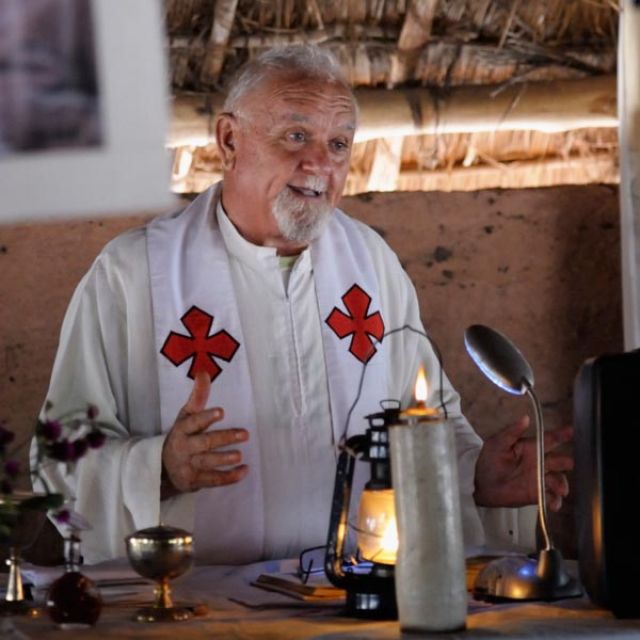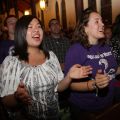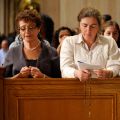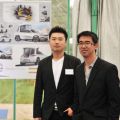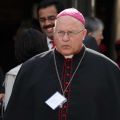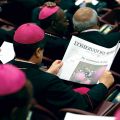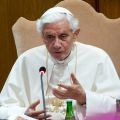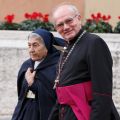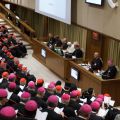News/International
Congolese refugees fear going home but feel unwelcome in South Sudan
By Paul Jeffrey, Catholic News ServiceYAMBIO, South Sudan (CNS) -- As the military hunt for Joseph Kony continues throughout this region, refugees who fled across the border from Congo to escape his Lord's Resistance Army say their welcome in South Sudan is wearing thin.
"I want to go home, but I'm afraid of Kony. As soon as the LRA is gone, I'll go back. It's my country," said Bernadet Adesa, 35, who lives in the Makpandu refugee camp near the border.
"This has been a good place for us, but every day there are more and more problems between us and the South Sudanese. If anything bad happens here, we Congolese get blamed for it," she said.
A Catholic priest who lives in the camp said the refugees are caught between being harassed inside South Sudan or returning to the Congo where the LRA, although weakened, still rampages through the forest, robbing, abducting and killing.
"The Congolese no longer feel welcome here. They live on land that's not theirs, and their freedom to work and make money has been curtailed," Italian Comboni Father Mario Benedetti told Catholic News Service.
After 38 years as a missionary in Congo, Father Benedetti accompanied the refugees to South Sudan in 2008. Today his parish is the refugee camp -- a ramshackle collection of mud huts 25 miles from Yambio.
Father Benedetti suggests tough economic times are at the root of the tension. South Sudan has been in a crisis since January, when the government in Juba cut off the oil it pumps through pipelines that run through neighboring Sudan. A Sept. 27 agreement between the two governments will restart the oil flow, but it will take months for the situation to improve.
"The Congolese are harder workers than the South Sudanese. They're better businesspeople. They can make enough money to buy a motorcycle, and the South Sudanese can't, so they get jealous of the refugees," the priest said.
Authorities have closed a market the refugees opened in the middle of their camp, forcing them to cross the road to buy basic supplies in a Sudanese market. Father Benedetti said the police had prohibited the Congolese from selling bags of charcoal along the road.
"The South Sudanese who live nearby weren't happy because of the competition. So now the refugees can only sell charcoal from their huts, but who's going to stop their car on the road and walk into the camp?" he asked.
Father Benedetti said a local radio station in Yambio is constantly insulting the Congolese and blaming them for every problem, a role he compared to Radio Mille Collines in Rwanda during that country's genocide.
"They're trying to discourage and frighten us, so we'll go back home. But it's not safe there yet. And here the Congolese have health care and schools, services they'd have to pay for back in the Congo," he said.
The bishop of the border area, who was a refugee in Congo and the Central African Republic, said he has spoken with local political officials about the harassment.
"Some of the local political leaders at times fail to respect the rights of the refugees, who are supposed to be protected and not harassed," Bishop Edward Hiiboro Kussala of Tombura-Yambio told Catholic News Service. "The host nation has the obligation to care for these people. But there's little knowledge of this, despite the fact that many of us were once refugees in their country."
The bishop said some refugees have felt forced by the harassment to return to Congo, which was not a safe option.
Security in the immediate area of the border has improved in the last year, in part because of the arrival of U.S. troops dispatched to help area armies combat the LRA. Yet Father Benedetti said he is disappointed in the results.
The U.S. soldiers "say they're here to observe and train other soldiers. But so far we don't know what they're doing," he said. "Yet just as they found Bin Laden, why can't they find Kony? It's an international shame."
Italian Comboni Sister Giovanna Calabria works in the nearby town of Nzara, where some of the U.S. troops are based as part of a joint operation with a special contingent of Ugandan troops.
"People here were happy when they (Americans) came. But no one is sure what they're doing now. I have the impression that their wings are cut. I don't hear that from them, as they keep their mouths closed. But I hear it from others," she said.
Bishop Kussala said that while stepped-up military patrols have recently kept Kony's forces at bay, the area is not truly at peace.
"As long as he's still in the forest, it's a negative peace. There may not be shooting, but the enemy hasn't been arrested and removed," he said.
Bishop Kussala said the church faces a variety of challenges in helping people move back home to rural settlements they abandoned when the LRA roamed the area. He also expressed concern for what might happen with community-based militias, widely known as the "Arrow Boys," which formed to defend isolated communities from LRA violence.
"If the LRA isn't there anymore, they'll find someone to replace the LRA, because they're accustomed to having weapons and moving around. So we're starting a rehabilitation program for these young men, but we need support," he said.
The bishop said that while he supported the military campaign to capture Kony, he was also pushing a diplomatic approach.
"They've employed a military approach to Kony here since 2007, and they still haven't captured him. So we just sent three priests to the Congo to talk about organizing a regional conference to see how the church could deal with this," Bishop Kussala said.
Sister Calabria said she doubts that diplomacy, religious or otherwise, will work.
"There is only one way to stop Kony," she said. "I don't want to kill him. If he is killed, it's his fault because he doesn't surrender.
She said Kony was "not a normal person, and he's forced many other people to not be normal anymore.
"Probably I'm not a good Christian, but it's time to stop him," she added.
Bishops tell synod church needs lively parishes, Bible literacy
By Cindy Wooden, Catholic News ServiceVATICAN CITY (CNS) -- The solemn yet exuberant liturgies of African Catholic churches are a model for other Catholic communities seeking to invigorate their parishes and reach out to lapsed members, a Nigerian bishop told the world Synod of Bishops.
The celebrations of the Eucharist and other sacraments must be "more efficacious moments of faith impact," Bishop Emmanuel Badejo of Oyo told the synod Oct. 15.
Bishop Badejo was one of dozens of synod members who spoke about enlivening parishes as the primary agents of the new evangelization.
"This can be done if we continually update homiletics and sacramental procedure with engaging art, language, idioms and imagery, which can better communicate their power and meaning," the bishop said.
"The solemn, but exuberant multimedia liturgy" found in many African parishes also helps people focus on the action of the Holy Spirit, he said, and gives them the strength needed to stand up against "consumerism, corruption, materialism and relativism."
Bishop Badejo said church leaders need to leave the "catacombs of fear and self-consciousness" and go where people spend their time, including "the streets, town squares, market places, nightclubs, shopping malls, even pubs and the slums."
"Priests and bishops may not get the 'high table' treatment in these places, but just a word or gesture from us" could be the first encounter leading to a life of faith, the bishop said.
The bishop also told synod members that the Catholic Church must establish a new relationship with today's media-savvy youths.
"Millions of youth all over the world are sharing the same stories, experiences and challenges -- irrespective of their location -- thanks to the new social, personal and digital media," he said. "The church must humbly seek their confidence and trust, knowing that youth prefer a co-communicator relationship to the old teacher-learner, speaker-listener model."
When young people and their talents are recognized and welcomed, he said, they can bring their faith and values to Catholic social media "with the right format and language."
Nigeria has been the scene of violence sown by terrorists claiming to act in the name of Islam. The bishop said that while dialogue with Muslims can be difficult at times, is necessary, especially for Catholic communities like his that have faithful who grew up in Muslim families.
South African Cardinal Wilfrid Napier of Durban told synod members that several dioceses in southern African, including his own, have experienced a blossoming of faith and a revival of parishes by using small-group faith-sharing programs like RENEW, which brings parish members together in each other's homes for six to eight weeks twice a year to focus on specific themes of discipleship or church teaching.
The new energy, he said, led parishes to realize they must provide adults with continuing education in the faith; become more serious about preparing couples for marriage and offer support to newlyweds; and offer specific catechesis to those who have just received the sacraments of Communion, confirmation or matrimony.
For Ugandan Bishop Sanctus Wanok of Nebbi, the church must improve its efforts to help Catholics understand the Bible, something which Catholics actually want to do, as seen in the growing interest in retreats and prayer meetings.
The thirst to know the word of God is even clearer among youths and young adults of his diocese who, he said, go to Mass on Sunday morning, "but later go to listen to evangelical preachers at their gatherings" or on the radio and television.
Chaldean Auxiliary Bishop Shlemon Warduni of Baghdad, Iraq, also emphasized the importance of the Bible for strengthening the faith of Catholics. "Without the word, we cannot encounter the Word in person," he said, referring to the Bible and to Jesus.
Christianity, he said, faces the serious obstacle of a "widespread mentality which scorns religion, considering it an obstacle to social and scientific development," creating a "fatal indifference, a type of masked atheism."
Unfortunately, he said, the public image of the church is worsened by "disagreement within the church. A church which often finds itself defending, rather than witnessing to Christ," is one that weakens the faith of the simple and fails to attract, he said.
Cardinal says converts’ top 3 Catholic things are penance, pope, Mary
By Cindy Wooden, Catholic News ServiceVATICAN CITY (CNS) -- Adult converts to Catholicism regularly cite three things about Catholicism that they find attractive: the sacrament of confession, the pope and devotion to Mary, said New York Cardinal Timothy M. Dolan.
"Those three things, guess what, were kind of de-emphasized" after the Second Vatican Council, the cardinal said Oct. 15 during a brief meeting with English-speaking reporters at the world Synod of Bishops on the new evangelization.
In his formal talk to the synod, Cardinal Dolan had said that a renewed appreciation for the sacrament of reconciliation is essential for the church's new evangelization.
He told reporters that "it seemed to be a truism after the Second Vatican Council that the council did away with the sacrament of penance, which, of course, is not true."
Instead of renewing the sacrament as the council wanted, he said, "we just gave up and we said, 'Well, that ain't going over,' so we stopped trying."
The interesting thing, Cardinal Dolan said, is that the sacrament of reconciliation actually is something attractive to many people, especially the young.
"They will often say that the church seems impersonal to them, a little faceless nameless," he said. "Well, boy, you can't find a more personal sacrament than penance. I mean this is one on one."
Cardinal Dolan said he never understood the desire to expand use of so-called general absolution, which the Vatican has severely restricted, because it was like "a drive-in carwash" and highly impersonal.
"There is nothing more personal" than going to confession one-on-one, "actually articulating sins and hearing an unworthy ambassador of Jesus say you are forgiven," the cardinal said.
New popemobile designs feature imaginative, high-tech touches
By Carol Glatz, Catholic News ServiceROME - Ten teams of young international designers battled it out to produce an innovative eco-friendly popemobile that could guarantee high "Pope visibility," meet strict security standards and promise low emissions.
Some proposed features included sunroof panels that would open like flower petals to side windows that could "live Tweet" messages to and from the pope.
The winners, however, kept it simple.
Eric Leong, 24, of Toronto, and Han Yong-fei, 23, of France, modified a hybrid Volkswagen Cross Coupe concept car into a white popemobile with an expandable solar roof and bullet-proof wheels. Their design also featured so-called "spray-on battery" technology in which each element of a traditional lithium-ion battery is incorporated into a liquid that can be sprayed, in layers, on many kinds of surfaces. The spray-on technology provides "better efficiency" for rechargeable batteries by reducing the car's weight, the designers said.
One eco-popemobile design finalist was a team of students from Turin's European Institute of Design. They used a BMW ActiveHybrid X6 vehicle and gave it a back roof made up of two dozen folding panels that could open up like flower petals, allowing the Pope to stand and greet the faithful. The car design also featured armoured side windows that double as monitors capable of displaying live, "selected Tweets for and from the Holy Father," according to the young design makers.
The Italian car-parts manufacturer, Berman, sponsored the competition near Mantua, Italy, Oct. 11-12 and invited select car design students from around the world to submit their drawings.
It marked the first time the annual Autostyle Design Competition had a special category for a popemobile, according to L'Osservatore Romano, the Vatican newspaper.
A panel of judges, including design directors from Alfa Romeo, Audi, Bentley, Fiat, Ford, Ferrari, Toyota and the University of Florence, picked the winning designs "based on their consistency with (a major carmaker's) brand, their originality and innovation, the comprehensiveness and elegance of the work and the feasibility of the projects," according to cardesignnews.com.
The popemobile designs had to use a production hybrid car model or concept car design and keep the car model's front features so as to maintain the brand image. Only the rear of the vehicle could be modified and it had to be done in such a way that it guaranteed comfort for five passengers and maximum "visibility of the Holy Father," it said.
Projects needed to use alternative energy, cutting-edge materials and innovative technology that allowed for rapid and easy rear access to and from the vehicle.
The Volkswagen Cross Coupe concept car uses two electric motors and a next-generation turbo diesel engine, according to manufacturers.
The Vatican publishing house, LEV, will publish a volume of the competition's best "green" popemobile projects and designs.
Pope Benedict XVI has frequently spoken of the importance of protecting the environment, and according to Vatican officials, is committed to saving energy at the Vatican. The Vatican has said its aim is to use renewable energy sources for 20 per cent of its energy needs by 2020, the target date set by the European Union for its members.
Antigonish bishop tells synod Church must respond to abuse crisis
By Cindy Wooden, Catholic News ServiceVATICAN CITY - Bishop Brian Dunn of Antigonish, N.S., whose diocese was rocked by clerical sex abuse crises, told the Synod of Bishops that the new evangelization must address the reality of distrust and disappointment the scandal left in its wake.
With the sex abuse crisis, Catholics have experienced "a great disorientation that leads to forms of distrust of teachings and values that are essential for the followers of Christ," Dunn told the synod Oct. 12.
The diocese of Antigonish has sold hundreds of properties in an effort to raise the money necessary to cover legal settlement and sexual abuse lawsuit costs from before Dunn's appointment. In 2011, the previous bishop, Raymond Lahey, pled guilty and was jailed on charges of importing child pornography. The former bishop was laicized by the Vatican in May.
The Catholic Church cannot ignore the need to find a way to "evangelize those who have been deeply hurt by clergy who have been involved in sexual abuse," Dunn told the synod.
One possible way forward, Dunn said, is to look at the story of the disciples, disillusioned by Jesus' death, who are met by the risen Christ on the road to Emmaus. Christ walks with them and listens to them, the bishop said.
Dioceses must have real structures in place for listening to victims and coming to appreciate "the depth of hurt, anger and disillusionment associated with this scandal," he told the synod.
At the same time, the Church needs to investigate the causes of the sexual abuse crisis and ensure measures are in place to protect children and vulnerable adults.
"Those who have been hurt consistently call for a change in certain structures in the Church, but it is not only ecclesial structures that must change," he said, there also must be "a profound change of mentality, attitude and heart in our ways of working with laypeople."
The bishop called for the appointment of pastoral teams of clergy and laypeople to administer parishes, for a formal recognition of "lay ecclesial ministers," and for a "deliberate and systematic involvement and leadership of women at all levels of Church life."
When Church life is marked by "co-responsibility," Dunn said, "the Gospel will be heard anew, our faith fill be passed on more effectively, we will be renewed in our faith and our witness will become more authentic."
Pope adds two saints to list of Church ‘doctors’
By Francis X. Rocca, Catholic News ServiceVATICAN CITY - Pope Benedict added 12th-century German abbess St. Hildegard of Bingen and St. John of Avila to the roster of doctors of the universal Church.
The Pope proclaimed the new doctors at Mass Oct. 7 in St. Peter’s Square, where the thousands in attendance included pilgrims waving Spanish flags, and Germannuns in traditional habits.
In his homily, Pope Benedict noted St. Hildegard’s knowledge of medicine, poetry and music, and called her a “woman of brilliant intelligence, deep sensitivity and recognized spiritual authority. The Lord granted her a prophetic spiritand fervent capacity to discern the signs of the times.”
He said that St. John, “a profound expert on the sacred Scriptures,” knew how to“penetrate in a uniquely profound way the mysteries of the redemption worked by Christ for humanity.”
The Doctors of the Church,saints honoured for particularly important contributions to theology and spirituality, come from both the Eastern and Western Church traditions.
The 35 doctors include early Church fathers such as Sts. Jerome, John Chrysostom and Augustine, and theologians such as Sts. Thomas Aquinas, Bonaventureand John of the Cross, but also St. Therese of Lisieux, who was honoured by Blessed John Paul II in 1997, despite her lack of scholarly accomplishment.
St. Hildegard is the fourth female doctor of the Church, joining Sts. Therese, Catherine of Siena and Teresa of Avila.
Four Canadian bishops to address synod
By Deborah Gyapong, Canadian Catholic NewsOTTAWA - Four Canadian bishops are among the 262 prelates gathered at the Vatican for the Synod of Bishops on the New Evangeliza- tion for the Transmission of the Christian faith Oct. 7-28.
Quebec Archbishop Gérald Cyprien Lacroix, Saint-Hyacinthe Bishop François Lapierre, Nelson Bishop John Corriveau and Antigonish Bishop Brian Dunn will each be making five-minute presentations at the synod. They were elected earlier this year by their fellow bishops to be delegates.
During the annual plenary of the Canadian Conference of Catholic Bishops (CCCB) in Ste-Adele, Que., Sept. 24-28 the delegates shared draft versions of their texts. The final texts will be published on the CCCB web site (www.cccb.ca) after they are delivered, the CCCB announced .
Corriveau was the first to speak, focussing on communion during his presentation Oct. 9. He told the synod that building community and promoting a sense of communion, particularly in the face of increasing individualism, is an important part of the new evangelization. The "spirituality of communion" is modeled on the relationship of love found among the members of the Trinity, a creative love revealed to humanity with the incarnation of Christ.
"The call to communion is more than a slogan. It is a conversion of heart," he said.
Lacroix told the bishops he would be speaking on sharing one's personal encounter with Jesus Christ and the willingness to welcome God's saving grace anew each day. He also stressed the role of lay men and women in sharing the Gospel.
Lapierre was to speak of new evangelization in the context of a Church that is increasingly impoverished, with aging priests and fewer interested young people. He said there are new opportunities hidden in these challenge.
Dunn was to examine what the Holy Spirit is saying to the Church in light of the sexual abuse crisis and proposes a deeper sense of listening and reconciliation to reach out to those who have been hurt.
Pope Benedict recalls Vatican II with praise and criticism
By Francis X. Rocca, Catholic News ServiceVATICAN CITY - On the eve of the 50th anniversary of the opening of the Second Vatican Council, L'Osservatore Romano, the Vatican newspaper, published a short reminiscence of the council by Pope Benedict XVI.
In the essay, the Pope recalls his presence at the opening of Vatican II, which he attended as a theological adviser. He both praises and criticizes some of the council's most consequential documents, regarding religious liberty and the Church's relationship with non-Christian religions and the modern world.
The essay is the introduction to a forthcoming collection of previously unpublished council-era writings by then-Father Joseph Ratzinger. The collection will be published in German this November.
"It was a moment of extraordinary expectation," the Pope writes of the procession of more than 2,000 bishops into St. Peter's Basilica Oct. 11, 1962. "Great things were about to happen."
"Christianity, which had built and formed the Western world, seemed more and more to be losing its power to shape society," he writes. "So that it might once again be a force to shape the future, (Blessed) John XXIII had convoked the council without indicating to it any specific problems or programs. This was the greatness and at the same time the difficulty of that task that was set before the ecclesial assembly."
A crucial question for the council fathers, Pope Benedict writes, was the "relationship between the Church and the modern world."
"From the 19th century onward," the Church had "visibly entered into a negative relationship with the modern era," he writes. "Did it have to remain so?"
Pope Benedict concludes that one of the council's best-known documents, "Gaudium et Spes," the Pastoral Constitution on the Church in the Modern World, failed to offer an adequate definition of the "essential features that constitute the modern era."
Instead, he writes, the "encounter with the great themes of the modern epoch" happened in "two minor documents, whose importance has only gradually come to light."
The Declaration on Religious Liberty, "urgently requested, and also drafted, by the American bishops in particular," clarified the Church's affirmation of the "freedom to choose and practice religion and the freedom to change it, as fundamental human rights and freedoms," he writes.
That declaration lent itself to troubling interpretations, the Pope writes, since it might seem to imply the "inaccessibility of the truth to man," which would make religion a merely subjective matter. But he writes that the 1978 election of Blessed John Paul II, from a country where the state denied religious freedom, revealed the "inner orientation of the faith toward the theme of freedom, and especially freedom of religion and worship."
The Pope also praises "Nostra Aetate," the council's declaration that the "spiritual, moral, and socio-cultural values (of non-Christian religions) were to be respected, protected and encouraged."
But the Pope writes that a "weakness of this otherwise extraordinary text has gradually emerged: It speaks of religion solely in a positive way, and it disregards the sick and distorted forms of religion."
In conclusion, Pope Benedict reiterates one of his most prominent teachings about Vatican II: that it must be interpreted in continuity with the Church's millennial traditions, not as a radical break with the past.
"The council fathers neither could nor wished to create a new or different Church. They had neither the authority nor the mandate to do so," he writes. "That is why a hermeneutic of rupture is so absurd and is contrary to the spirit and the will of the council fathers."
Church needs witness of women proud to be Catholic, archbishop says
By Carol Glatz, Catholic News ServiceVATICAN CITY (CNS) -- New evangelization will never be possible without women who are proud and happy to belong to the Catholic Church, the president of the Belgian bishops' conference told the Synod of Bishops.
"Two-thirds of active members of the Church are women," and the primary evangelizers are usually women, "however many women feel discriminated against by the Church," Archbishop Andre-Joseph Leonard of Mechelen-Brussels told the synod Oct. 9.
"It's high time" the Church better explain why only men may be ordained, he said.
It is not because women are looked upon as being less worthy or able to minister to others, "it's absolutely the contrary," the archbishop said.
The priesthood is open only to men "because the male figure of the priest is a representative of Christ, the groom, who came to wed humanity" through his spouse, the Church, he said.
A male priesthood "is only out of respect for this profound symbol of marriage," Archbishop Leonard said. "Let us remember and remind the Church of her profound feminine nature as the bride of Christ and our mother."
The archbishop spoke forcefully and with emotion, said Basilian Father Thomas Rosica, who briefed reporters about what occurred in the synod hall. The speech was a bit of a "shocker," said one synod participant, because the archbishop is considered to be very conservative.
Archbishop Leonard asked everyone to give thanks for "the quality and the specificity of the massive contribution of women to evangelization."
"Without joyous women who are recognized for all of their qualities" and who are proud of belonging to the Church, "there will be no new evangelization," he told synod participants.
He called on church leaders to "never hesitate to entrust more important roles to women in the life of the Church. We must find new and strong ways to do this," he said.
Synod participants spent the morning session Oct. 10 in small groups divided by language.
In one of the four English-language groups, Cardinal Timothy M. Dolan of New York made great efforts to get the three women and four laymen in the group to speak and participate as much as the bishops, according to Father Rosica.
Together with Australian Cardinal George Pell of Sydney, Cardinal Dolan "created a mood to speak because there was a little bit of timidity" within the group of 30 English-speakers, said Father Rosica, who is part of that working group.
Cardinal Dolan said it was his first experience at a world Synod of Bishops, and that he was not there just to sit and listen to bishops, but to also tap into the rich experience and expertise of the religious women and laypeople attending as experts or observers who normally do not get a chance to address the larger assembly.
Father Rosica said the initiative was "very well-received" and that one nun told him she was pleased they weren't there "just to sit in the back and listen."
Catholic leaders: Nobel Prize for medicine a triumph for ethics
By Simon Caldwell, Catholic News ServiceMANCHESTER, England - Catholic leaders in Europe hailed the decision to give a Nobel Prize to two pioneers of adult stem-cell research as a triumph for ethics.
A statement from the Commission of the Bishops' Conferences of the European Community, known as COMECE, said that awarding the Nobel Prize in physiology or medicine to John B. Gurdon and Shinya Yamanaka represented an "important milestone" in recognizing the superior potential of adult stem-cell research over destructive experimentation on human embryonic stem cells.
The Anscombe Bioethics Centre, an institute serving the Catholic Church in the United Kingdom and Ireland, also described the award as an "achievement of great ethical significance."
"This technique offers hope of progress in stem-cell research without relying on the unethical destruction of human embryos," said David Jones, director of the Anscombe center in Oxford, England.
"The past attempts to clone human embryos and the bizarre experiments to create admixed human-nonhuman embryos have delivered nothing," he said.
"In contrast, the transformation of adult cells into stem cells is making great progress," he continued. "This is science at its best: both beautiful and ethical."
The Nobel committee said England's Gurdon and Yamanaka of Japan had "revolutionized" science through their work.
"These discoveries have also provided new tools for scientists around the world and led to remarkable progress in many areas of medicine," the committee said.
Both scientists were involved in research into changing mature cells into stem cells, which have the potential to become specialist organ cells and be harvested in the potential treatment of a variety of diseases.
Many hope such work may prepare the ground for therapies to repair heart tissue after heart attacks, for instance, or to reverse the progress of Alzheimer's and Parkinson's diseases.
Gurdon distinguished himself by using an intestinal sample to clone frogs, and Yamanaka pioneered a technique of reprogramming mature cells to become "pluripotent" by altering their DNA.
In an Oct. 8 statement, COMECE said the award should encourage European Union institutions to switch funding from "ethically problematic and scientifically and economically less-promising" embryonic stem-cell research to non-embryonic stem cell research, which held out greater potential.
"This is an important milestone in recognizing the key role that non-embryonic stem cells play in the development of new medical therapies as alternatives to human embryonic stem cells," the statement said.
"There have been continuing scientific advances in fields of research involving alternative stem cells ... (that) present better prospects for clinical applications; or have indeed already demonstrated widespread clinical results and do not raise any special ethical problems," it said.
"Today's Nobel Prize rewards such efforts to discover alternatives," the statement added.
For synod members, media part of the problem, part of the solution
By Cindy Wooden, Catholic News ServiceVATICAN CITY - The Catholic Church needs to use its media and social networks to spread the faith because much of the news media cover the church in a way that "is full of lies," Hungarian Cardinal Peter Erdo of Esztergom-Budapest told the Synod of Bishops.
Across Europe, there is "a spreading ignorance about the Christian faith," which is exacerbated by the media "misinforming the public as to the content of our faith," the cardinal told the synod Oct. 8.
Cardinal Erdo, president of the Council of European Bishops' Conferences, was one of five speakers summarizing the state of evangelization in different regions of the world. Each of the five mentioned the role of the media, and several insisted on the church's obligation to use social networks to reach new generations of Catholics.
The Hungarian cardinal told the synod that Europeans are losing an awareness of just how essential Christianity has been to the development of their cultures, democracy and the human rights they hold so dear. The loss, he said, is a "consequence of an audiovisual culture" in which clear concepts and logical reasoning are ignored.
Mexican Archbishop Carlos Aguiar Retes of Tlalnepantla, president of the Latin American bishops' council, told the synod that since the Second Vatican Council, the Latin American bishops have focused on building community, entering into dialogue with the world around them and educating the faithful about their role in transforming society.
Today, he said, the church must "employ new communications technologies to allow the life and mission of the church to be known and for dialogue with the world." In today's culture, he said, "the social communications media are most influential."
In addition, Archbishop Aguiar said, especially in trying to reach younger people, the church must "make use of social networks to spread Catholic thought and its current answers to cultural challenges."
Young people are searching for meaning in their lives, he said, and if the church is not present in their world with responses, they end up abandoning their search for God.
Indian Cardinal Oswald Gracias of Mumbai, president of the Federation of Asian Bishops' Conferences, told the synod that Asia is experiencing a boom in communications technology. "This is not to be viewed as a threat, but a great gift from God to be used to spread the good news."
The cardinal said the church must help parents, pastors and teachers who can train young people to use the new media and to benefit from them.
Archbishop John A. Dew of Wellington, New Zealand, president of the Federation of Catholic Bishops' Conferences of Oceania, told the synod that even the secular media have helped Catholic evangelization through the attention they have given the declaration of saints from the region.
The examples of local people formally recognized as saints by the universal church "will do more for the new evangelization that we can imagine as the media is interested and captures peoples' imagination," the archbishop said.
If the church wants to find young people, he said, it must use the new media and new gadgets they use. "In these young people we see a sincere and sometimes painful search for meaning and spirituality as they bridge traditional cultural values and the excitement of the technological age with the swipe of an iPad or smartphone."
In addition to looking at the media, the regional reports to the synod touched on almost every area of church life from the importance of the liturgy to the positive impact of immigration, and from the role of new lay movements to the need to support traditional families.
Tanzanian Cardinal Polycarp Pengo of Dar es Salaam, president of the Symposium of Episcopal Conferences of Africa and Madagascar, said the rise of Islamic fundamentalism in Africa is a challenge to the work of the church on the continent. Catholics must "face the difficulty of dialoguing with the vast majority of good Muslims who, however, are mute, and the small groups of fundamentalists," who are not open to dialogue.
Dialogue also was a key topic in the other regional reports.
Cardinal Gracias said that with Christians making up only 3 percent of the population in Asia and with persecution of Christians not being completely uncommon, "for us in Asia, dialogue is a necessity, not a luxury."
At the same time, he said, many Asian cultures have a deep respect for life -- including for the life of animals and plants -- and it should not be difficult, through dialogue, to help people see that respect for life must include the life of the unborn and the life of their neighbors who belong to a different faith.
Cardinal Erdo said that while "some new (Christian) communities are strongly anti-Catholic," dialogue and cooperation with the Orthodox and Protestant communities is growing. Particularly with the Orthodox, he said, there are joint efforts to address moral and social questions, to protect the traditional family and to defend human life.
Archbishop Aguiar said that dialogue is increasingly important in Latin America as its cultures become more pluralistic. The church's dialogue efforts, he said, must reach out to all sectors of society to share the church's position on issues such as human dignity, and to find ways to build a consensus on how to tackle problems related to education, the economy, migration, justice and peace and the need to protect the environment.
The archbishop agreed with other speakers that Catholics must learn the content of their faith from the Catechism of the Catholic Church, but he insisted they also must know Catholic social teaching because they have an obligation to transform society in line with Gospel values.

